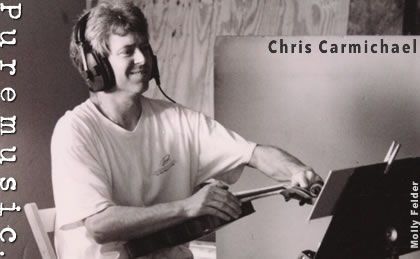
A Conversation with Swan Dive (continued)
PM: On the other hand, where there's a dearth of that, there's a wealth of strings, as we've said a couple of times, and so this is our opportunity to rave about Chris Carmichael, specifically. Let's go into how those strings were recorded, because I remember hearing the story when I was at the listening party.
BD: It's sort of the budget string section, meaning that we couldn't afford a string section, so Chris multi-tracked himself many times over, on some songs as many as ten, fifteen tracks of strings.
PM: So a lot of parts would be in unison, for instance, just to fatten it up.
BD: Yeah, sometimes tripled. And also, because we couldn't afford a section, when Brad would record each part, Chris would change chairs. They had three chairs, and then they'd move the mic to create this audio illusion.
PM: Oh, actual imagining.
BD: Yeah.
PM: That's really brilliant. Whose idea was that?
BD: I think it was Brad's. But it's amazing that Chris was able to focus for just hours on end. And again, he'd have the whole thing mapped out in his head. He'd be playing one part or two parts, and you'd think, "Ah, where is this going?" You're listening to it as it's being put down. And then as it would start to reveal itself, take shape, you'd see the full splendor of it.
MF: He had all of his violins around him. And just two days before the session, he'd pinched a nerve in his neck. And he had to go to the doctor, and he couldn't move--he couldn't move his neck. He came to this session in that horrible heat. We recorded him next door to Brad's, at the Ironworks, a giant warehouse. It was about 10,000 degrees in there, no air conditioning. And in between we would have to go and give him neck massages, because his neck was still really hurting. But he never once complained about it. And he was doing twelve-hour days for three days.
BD: He has the best attitude of almost any musician I've ever worked with. Just a constant "Yes."
PM: Wow.
MF: He's just really open to any ideas. He's another brilliant guy.
PM: And recording in ridiculous heat in a big warehouse--you called it the Ironworks?
MF: It's where Robin Eaton's wife used to have her business, where they made these cool lamps with stuff imported from France, and then they'd work on it.
PM: Big gates, too, or something like that?
MF: Uh-huh. But it was just this empty warehouse. And we had to turn the air off so it wouldn't make noise. It was incredibly hot in there. And you couldn't open the windows because the train tracks are just a couple of feet behind you.
PM: The wonderful world of recording.
[laughter]
BD: Yeah.
MF: I loved to hear the train on the record, anyway, any time it happened.
And just to get some air, Brad and Chris would ride the bike around, because it's a big old place. They'd ride around inside the warehouse, to cool off.
PM: Oh, they'd ride the bike inside.
MF: Yes, trying to get some air in between takes. But it is a beautiful place. It's big and mostly empty. It really sounded incredible in there.
And Brad had his little laptop set up with his junk everywhere. It was just so cool. I've got some pictures I'll send you.
PM: Was he doing a lot of those tracks with his laptop because he couldn't bring all his stuff?
BD: The whole record was made on a laptop, basically, and an M-box.
MF: David Henry also came in to play on a couple of songs.
PM: Yeah, he played some great cello. [see our review in this issue of Brother Henry, David's duo with his brother Ned]
MF: Bill was there the first day with Chris, and then he had to go to New York for the David Bowie interview, and then came back. And I was there that day, just watching in awe of the sound. I was just so honored to be part of this project, because I think it would be beautiful without any vocals. I'm just so proud to get to be involved in it because of what they created. It's just beautiful, to me. I couldn't believe it. I mean, I still feel like that. I listen to it thinking, "Oh, my God, I'm so happy I got to sing on this."
PM: It's certainly the closest thing I've heard to Bookends since Bookends.
BD: Oh, that's nice. I take that as a high compliment.
PM: And if I heard you right recently, you're already considering going back in the studio, is that true?
BD: Well, we'd like to. I mean, we probably won't go back in until December. But yeah, we're already thinking about the next record.
PM: I don't know if I've known a more prolific mofo than yourself.
MF: There are so many songs, and--
BD: But I'm not as prolific now as I was a couple years ago.
PM: But you're doing more journalistic work, more--
MF: I'll tell him, "We've got to do this for the next record. Make some kind of note so we'll remember this." And then it'll just get skipped over, he has so many newer ones.
PM: That's what my brother calls Songwriter's Disease: "My best song? My latest song." [laughs]
MF: Bill just has so many, and they're all really good. It's hard to decide. It's difficult to weed out great songs. Lucky for me.
PM: Yeah, right. That's a prosperity problem.
MF: [laughs] continue